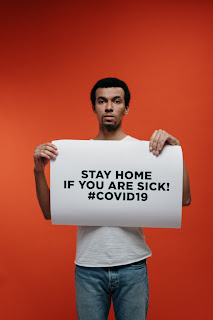So you tested positive for COVID-19 and you're wondering what to do. Don’t panic, I’ll talk you through it. The coronavirus is scary. And for some people, especially those with underlying conditions, it could potentially be life-threatening. For a lot of people out there who get COVID-19, it will not require you to come to the emergency department to see me, rather just self-isolate and recover at home. That’s why today I’m here to explain to you what you need to know about handling your COVID-19 diagnosis and what to do at home, when is it time to go to the hospital, and other must-know tips that you should know if you have COVID-19.
Hey everyone, I’m Zara and I got this information from doctor Jordan Wagner, ER doctor. Make sure you subscribe to my blog for the latest information out there. So you tested positive. Now what? First thing's first, if you are experiencing severe COVID symptoms such as trouble breathing, pain or pressure in your chest, or lips or face turning blue, you should immediately call your doctor and see if you need to go to the hospital for treatment. However, if you are sick with coronavirus and are experiencing milder symptoms or no real symptoms at all, I'm going to talk you through what you should do if have tested positive for COVID-19.
(1). Self-Quarantine: We need to prevent you from giving COVID-19 to others and quarantining or staying away from others is a huge part of that. We know that it spreads most commonly in households. I know it might be difficult to lock yourself in a room with a bathroom and have access to food. But this would be the ideal situation.
Other steps would be to keep windows open as best you can to get airflow circulating and sanitizing all surfaces. That's very important. Also, try to limit interactions with people living in the same space as you. If you do have a roommate or other household members, wearing a mask in the home by all individuals is very important. I know it's weird and many don’t believe in it. But it has been shown to reduce viral loads. If you must share a bathroom, it should be cleaned and sanitized for coronavirus after each use.
(2). Oxygen monitoring: The main reason people get hospitalized for COVID is due to low oxygen levels requiring supplemental oxygen. Being able to monitor your own levels at home is super important. You can stay up to date on how your body is handling the virus. So many times people come to the hospital not feeling well and their oxygen is 50 or 60. A normal person's oxygen level is 95 to 100 percent. Patients get admitted to the hospital when their oxygen levels are about 90 or less. There are plenty of inexpensive options for oximeters out there.
(3). Monoclonal Antibodies: Most individuals in good health and with healthy immune systems will recover from COVID-19 but there are a lot of people who have other risk factors that can make COVID-19 worse. This is why I suggest monoclonal antibodies. Monoclonal antibodies are laboratory-made proteins that mimic the immune system’s ability to fight off harmful antigens such as viruses. There are currently two companies that have made these, Eli Lilly and Regeneron.
These antibodies are given to people with mild cases to hopefully prevent the development of severe COVID symptoms and thus prevent hospitalization. It is used for people not requiring supplemental oxygen. Once a patient requires supplemental oxygen, it is too late for monoclonal antibodies to be used. Who can get monoclonal antibodies? Anyone over the age of 65. Anyone with chronic issues, such as immunocompromised, DM, obesity. It can be given to anyone over the age of 12 or a weight greater than 88 pounds or 40 kilograms. This medication is given through a 1-hour infusion.
(4). Supplements: There are supplements you can take to optimize your body's defenses and other medications. Studies have shown the importance of having optimal levels of vitamins and minerals in our bodies for an intact defense system. Just like other articles I have done, vitamin D, vitamin C, these vitamin k2, Zinc, Quercetin have all been shown to help our immune system and defend against invaders.
Over-the-counter medications, in terms of specifics, Acetaminophen (Tylenol), naproxen or Aleve, or ibuprofen which is Advil or Motrin can help lower fever, assuming you don’t have any health history that would prevent you from using them. But keep in mind, sometimes having a fever is a good thing, it is our body's natural way to treat to kill the virus. So, to reduce a fever, or not to reduce a fever. That is a big question. Just as with a fever that can hurt us if it gets out of control, the same thing occurs with COVID when it over reacts our immune, it can then in turn hurts us. Beyond that, there are no at-home medications specific for COVID-19 at the moment. Please be wary if anyone says there is. Also, keep in mind that antibiotics treat bacteria and COVID-19 is a virus. Therefore, please don't ask to be prescribed an antibiotic. It won't work.
(5). The Number Five Thing To Do If You Have Coronavirus: Sleep Your body is in a battle with COVID, You need to get rest. You want your body to use all of its energy to fight off the virus. We need to be getting 7-10 hours of sleep a night. Studies have shown that the lack of sleep and rest leads to worse outcomes when it comes to treating the virus.
(6). How Long To Stay Isolated Or Quarantine?: A question I hear often is "how long until I am not infectious?" No one actually knows the exact answer to this yet, and if someone does tell you, think twice. If you tested positive and have symptoms, you should wait at least ten days since symptoms first appeared and, you should have no fever for at least 24 hours without taking medications for a fever and your symptoms should be improved.
This is the same if you are presumed positive for having coronavirus even if you didn’t get a test. If you tested positive but you don't have any symptoms, quarantine for at least ten days from the date of your positive test as long as you stay free of symptoms. If you develop symptoms then the clock changes and the ten days begins the day you started having symptoms. When in doubt contact your doctor or check out the CDC or the World Health Organization websites for updates on quarantine guidelines and precautions.
(7). If you have to go to the hospital and get admitted to the hospital, what should you expect? As I mentioned before, generally speaking, you should go to the hospital when you are experiencing shortness of breath, chest pain, uncontrollable fevers, decreasing oxygen levels, or if you can not be seen by your doctor and you have concerns. The emergency room doctors will check your vital signs, get blood work, get a chest x-ray normally, and a COVID test. Most of the time an ER doctor can tell by the oxygen level and a chest x-ray if someone has severe COVID-19. From there, if you are having trouble breathing or a low oxygen level, we will give you supplemental oxygen.
There are multiple types of this: a simple nasal oxygen, high pressure, high volume nasal oxygen, a face mask called a nonrebreather, a high-pressure mask called BiPAP, and then lastly intubation, placing a tube in the airway and using a ventilator. We continue to try to avoid the ventilator as much as possible as we know patients do better when they use the other forms of support. A note, hospitals have varying degrees of visitor allowances to the hospital. If a family member is going to be admitted to the hospital, ask the ER doctor or the ER nurse if you can see them in the ER before they go to the admitted bed. So you can spend a few minutes with them and comfort them.
(8). What medications will be used in the hospital?: You may be wondering, what medications do we give patients who are hospitalized with COVID-19? Currently, we treat with steroids as it has been proven to decrease mortality and hospital states. We will also give everything we can that might be helpful. Vitamins, convalescent plasma, remdesivir, antibiotics to prevent accompanying bacterial infections, hydration with IV fluids, and time. Our bodies are fighting.
Everything we have is to help support that. There is no cure for this virus, but there are many simple ways to treat the symptoms that will help your body fight the virus. It is important to contact your doctor if you test positive to see, if there are any outpatient treatments available to you. Most people will feel better after a few days and feel totally fine within a week. However, they will still be contagious, so they should remain in isolation for ten days from the time of first symptom and as a general reminder, stay home.
Don’t run off to the store to purchase any of these over the counter medications or supplies if you don’t have them already. A lot of stores offer contactless delivery straight to your door, Or ask your friend or family member to bring them and drop them off outside your door. This way you can avoid coming into contact with anyone, and further spreading the virus. All right, that's been a quick overview on what to do if you have COVID-19 with me, Zara. Have you had COVID? What was your recovery process like? And do you have other COVID questions or other medical topics that you’d like to discuss? Please let me know in the comments. I’d love to hear from you. As always, make sure you subscribe and hit that bell notification. That way you tell blog, you want to read more of my articles. Thank you so much for reading and stay healthy.





















































































No comments:
Post a Comment
wgdyrj@gmail.com